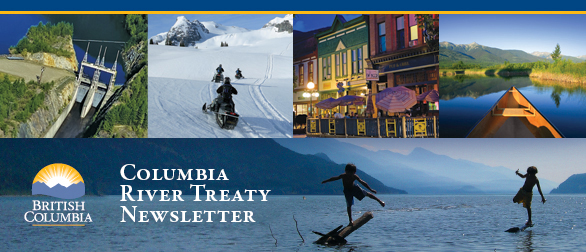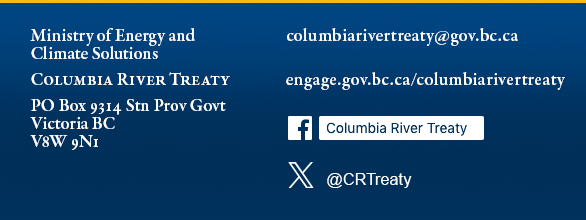Columbia River Treaty
Edition: February 2020

Columbia River Treaty Ecosystem Function: 2019 Update
Feb 11, 2020
The current negotiations between Canada and the U.S. on modernizing the Columbia River Treaty provide a unique opportunity to consider ways to improve ecosystem function within the Columbia River Basin in Canada.
Columbia Basin Indigenous Nations are currently leading work that will inform the Canadian negotiating team’s discussions on how to address ecosystems in a modernized Treaty. This involves developing goals and objectives for what a healthy ecosystem would look like, and ways to measure whether these goals and objectives are met.
This work focuses on four broad ecological themes: ecosystem productivity, floodplain/riparian/wetlands, river and reservoir ecosystems, and anadromous (ocean-going) fish species. Guiding this work is the Columbia River Treaty Ecosystem Function Sub-committee, composed of representatives of the Ktunaxa, Secwepemc and Syilx/Okanagan Indigenous Nations, the provincial government, consultants, and environmental non-governmental organizations.
The goals and objectives consider various aspects of river and reservoir ecology, such as: habitat for wildlife around the river and reservoirs; access for fish to tributaries; productivity of river and reservoir habitats; and flow requirements for possible future salmon restoration. To ensure that these matters are considered in the context of a changing climate, Indigenous Nations are consolidating climate-change information about the Columbia Basin, which will inform all studies.
There are 12 studies in the ecosystem function workplan over 2 years, funded by the B.C. Ministry of Energy, Mines and Petroleum Resources. A more general compilation project is also underway to develop a database of relevant reports and information associated with ecosystem studies that have been completed in the Columbia River Basin. The database will draw from sources including the Fish and Wildlife Compensation Program, BC Hydro Water Licence Requirements (including Water Use Plans), Columbia Basin Trust, and Columbia Power Corp. projects, and associated data.
The other studies focus on the development of specific goals, objectives, and performance measures of ecosystem function. The overarching purpose of many of these studies is to identify ways to improve ecosystem function by modifying changes in flows and reservoir levels in the Canadian portion of the Columbia River Basin. These scenarios can then be considered alongside current operations and future scenarios for power production and flood risk management.
A computerized model for exploring the implications of different scenarios will be developed in parallel with the 12 projects. The goal is to have the initial model and preliminary results from the ecosystem function studies developed in early Summer 2020.
A presentation on this work was delivered at the Province of B.C.’s fall 2019 community meetings. You can view that presentation here https://engage.gov.bc.ca/columbiarivertreaty/2019-community-meetings/


